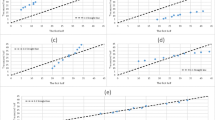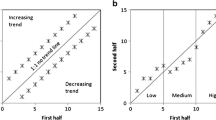Abstract
In this study, the trends, stabilities of temperature, and rainfall data have been analyzed in detail for hydrometeorology time series recorded since 1870 in Oxford city in England. The innovative trend analysis (ITA) method has been used to identify and analyze the piecewise trends and stabilities of the selected time series. To compare the results, the modified Mann–Kendall (MMK) and Sen’s slope (SS) methods have been applied to each series as a piecewise ITA application. To obtain reliable and objective conclusions, ± 5% and ± 10% trend percentage lines have been considered in the application of the ITA method. The piecewise ITA method provides more detailed information in this study, compared to the studies in the literature such as the MMK. Identification of trends that implies climate change is taken into consideration by the ITA approach for future design purposes. In this study, the available time series with a record length of 150 years has been divided into sub-series of 30 years considering the last 30-year period in which climate change began to be discussed due to its significant effects. As a result, when the trends of 150 years are examined for the different partial series, it is seen that the temperature increase in the 1990–2019 period is much higher than the past 120 years. The highest average rainfall occurred in the 1990–2019 and 1900–1929 periods, and their amounts are nearly similar.





Similar content being viewed by others
Availability of data and material
The data were provided from the United Kingdom (UK) National Meteorological Service, Met Office (https://www.metoffice.gov.uk/).
Code availability
None.
References
Ahmad I, Tang D, Wang T, Wang M, Wagan B (2015) Precipitation trends over time using Mann-Kendall and spearman’s rho tests in swat river basin, Pakistan. Adv Meteorol 2:1–15
Ahmad I, Zhang F, Tayyab M, Anju MN, Zaman M, Liu J, Saddique Q (2018) Spatiotemporal analysis of precipitation variability in annual, seasonal and extreme values over upper Indus River basin. Atmos Res 213:346–360
Alashan S (2018) An improved version of innovative trend analyses. Arab J Geosci 11(3):1–6
Alashan S (2020) Testing and improving type 1 error performance of Şen’s innovative trend analysis method. Theor Appl Climatol 142(3):1015–1025
Amirataee B, Montaseri M, Sanikhani H (2016) The analysis of trend variations of reference evapotranspiration via eliminating the significance effect of all autocorrelation coefficients. Theor Appl Climatol 126(1):131–139
Arslan G, Kale S, Sönmez AY (2020) Trend analysis and forecasting of the Gökırmak River streamflow (Turkey). Oceanol Hydrobiol Stud 49(3):230–246
Bayazit M, Önöz B (2007) To prewhiten or not to prewhiten in trend analysis? Hydrol Sci J 52(4):611–624
Ceribasi G, Ceyhunlu AI (2020) Analysis of total monthly precipitation of Susurluk Basin in Turkey using innovative polygon trend analysis method. J Water Clim Chang. https://doi.org/10.2166/wcc.2020.253
Dabanlı İ, Şen Z (2018) Classical and innovative-Şen trend assessment under climate change perspective. Int J Glob Warming 15(1):19–37
Dabanlı İ, Şen Z, Yeleğen MÖ, Şişman E, Selek B, Güçlü YS (2016) Trend assessment by the innovative-Şen method. Water Resour Manag 30(14):5193–5203
Dabanli I, Şişman E, Güçlü YS, Birpınar ME, Şen Z (2021) Climate change impacts on sea surface temperature (SST) trend around Turkey seashores. Acta Geophys 69(1):295–305
Douglas EM, Vogel RM, Kroll CN (2000) Trends in floods and low flows in the United States: impact of spatial correlation. J Hydrol 240(1–2):90–105
Güçlü YS (2018) Multiple Şen-innovative trend analyses and partial Mann-Kendall test. J Hydrol 566:685–704
Güçlü YS, Dabanlı İ, Şişman E, Şen Z (2019) Air quality (AQ) identification by innovative trend diagram and AQ index combinations in Istanbul megacity. Atmos Pollut Res 10(1):88–96
Güçlü YS, Şişman E, Dabanlı İ (2020) Innovative triangular trend analysis. Arab J Geosci 13(1):1–8
Haan CT (1977) Statistical methods in hydrology. The Iowa State University Press, Ames, p 378
Hamed KH, Rao AR (1998) A modified Mann-Kendall trend test for autocorrelated data. J Hydrol 204(1–4):182–196
Kalra A, Piechota TC, Davies R, Tootle GA (2008) Changes in US streamflow and western US snowpack. J Hydrol Eng 13(3):156–163
Kendall MG (1975) Rank correlation measures. Charles Griffin Inc., London
Malik A, Kumar A, Ahmed AN, Fai CM, Afan HA, Sefelnasr A, Sherif F, El-Shafie A (2020) Application of non-parametric approaches to identify trend in streamflow during 1976–2007 (Naula watershed). Alexandria Eng J 59(3):1595–1606
Mann HB (1945) Nonparametric tests against trend. Econometrica: J Econ Soc 13(3):245–259
Mohammad P, Goswami A (2019) Temperature and precipitation trend over 139 major Indian cities: an assessment over a century. Model Earth Syst Environ 5(4):1481–1493
Mohorji AM, Şen Z, Almazroui M (2017) Trend analyses revision and global monthly temperature innovative multi-duration analysis. Earth Syst Environ 1(1):1–13
Morbidelli R, Saltalippi C, Flammini A, Corradini C, Wilkinson SM, Fowler HJ (2018) Influence of temporal data aggregation on trend estimation for intense rainfall. Adv Water Resour 122:304–316
Nelson GC, Rosegrant MW, Koo J, Robertson R, Sulser T, Zhu T, Ringler C, Msangi S, Palazzo A, Batka M, Magalhaes M, Valmonte-Santos R, Ewing M, Lee D (2009). Climate change: impact on agriculture and costs of adaptation. Intl Food Policy Res Inst. https://doi.org/10.2499/089629535
Oruc S (2020) Visual and statistical inference of hourly and sub-hourly extreme rainfall trends Central Anatolia, Turkey case. Acta Geophys 69(1):199–216
Öztopal A, Şen Z (2017) Innovative trend methodology applications to precipitation records in Turkey. Water Resour Manag 31(3):727–737
Phuong DND, Dung HM, Loi NK (2021) Temporal trend possibilities of annual rainfall and standardized precipitation ındex in the Central Highlands, Vietnam. Earth Syst Environ. https://doi.org/10.1007/s41748-021-00211-y
Pingale SM, Khare D, Jat MK, Adamowski J (2014) Spatial and temporal trends of mean and extreme rainfall and temperature for the 33 urban centers of the arid and semi-arid state of Rajasthan, India. Atmos Res 38:73–90
Sen PK (1968) Estimates of the regression coefficient based on Kendall’s tau. J Am Stat Assoc 63(324):1379–1389
Sonali P, Kumar DN (2013) Review of trend detection methods and their application to detect temperature changes in India. J Hydrol 476:212–227
Şen Z (2008) Solar energy fundamentals and modeling techniques: atmosphere, environment, climate change and renewable energy. Energy Clim Chang. https://doi.org/10.1007/978-1-84800-134-3
Şen Z (2012) Innovative trend analysis methodology. J Hydrol Eng 17(9):1042–1046
Şen Z (2017a) Hydrological trend analysis with innovative and over-whitening procedures. Hydrol Sci J 62(2):294–305
Şen Z (2017b) Innovative trend methodologies in science and engineering. Springer International Publishing, New York
Şen Z, Şişman E, Dabanli I (2019) Innovative polygon trend analysis (IPTA) and applications. J Hydrol 575:202–210
Şişman E (2019a) Ege ve Akdeniz Kıyılarında Seçilen İstasyonlarda Deniz Suyu Sıcaklıkları İçin Soğuma Dönemi Trend Analizleri (In Turkish). J Nat Hazards Environ 5(2):291–304
Şişman E (2019b) Türkiye’de Seçilen Hava Kalitesi İzleme İstasyonları için Eğilim (Trend) Değerlendirmeleri (In Turkish). J Nat Hazards Environ 5(1):134–152
Şişman E (2019c) Piecewise wet and dry spell duration-number relationship and possible climate change impact identification in Turkey. Arab J Geosci 12(24):1–11
Şişman E (2021) Power law characteristics of trend analysis in Turkey. Theor Appl Climatol 143(3):1529–1541
Theil H (1950) A rank invariant method of linear and polynomial regression analysis. Proc K Ned Akad Wet 53:1397–1412
Thistlethwaite J, Wood MO (2018) Insurance and climate change risk management: rescaling to look beyond the horizon. Br J Manag 29(2):279–298
Von Storch H (1995) Misuses of statistical analysis in climate research. In: Storch HV, Navarra A (eds) Analysis of Climate Variability: Applications of Statistical Techniques. Springer-Verlag, New York, pp 11–26
Wang X, Chen D, Ren Z (2010) Assessment of climate change impact on residential building heating and cooling energy requirement in Australia. Build Environ 45(7):1663–1682
Wang Y, Xu Y, Tabari H, Wang J, Wang Q, Song S, Hu Z (2020) Innovative trend analysis of annual and seasonal rainfall in the Yangtze River Delta, eastern China. Atmos Res 231(3):104673
Watts N, Adger WN, Agnolucci P, Blackstock J, Byass P, Cai W, Costello A (2015) Health and climate change: policy responses to protect public health. The Lancet 386(10006):1861–1914
Zhang X, Harvey KD, Hogg WD, Yuzyk TR (2001) Trends in Canadian streamflow. Water Resour Res 37(4):987–998
Acknowledgements
The author(s) would like to thank the United Kingdom (UK) National Meteorological Service, Met Office, for providing the data of Oxford for this study.
Author information
Authors and Affiliations
Contributions
Eyüp ŞİŞMAN and Burak KIZILÖZ contributed equally to this paper.
Corresponding author
Ethics declarations
Ethics approval
This article abides by copyright laws.
Consent to participate
Not applicable.
Consent for publication
Not applicable.
Conflict of interest
The authors declare no competing interests.
Additional information
Publisher’s note
Springer Nature remains neutral with regard to jurisdictional claims in published maps and institutional affiliations.
Rights and permissions
About this article
Cite this article
Şişman, E., Kizilöz, B. The application of piecewise ITA method in Oxford, 1870–2019. Theor Appl Climatol 145, 1451–1465 (2021). https://doi.org/10.1007/s00704-021-03703-z
Received:
Accepted:
Published:
Issue Date:
DOI: https://doi.org/10.1007/s00704-021-03703-z




